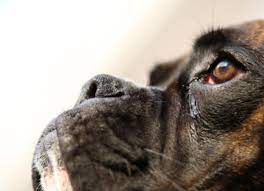Signs of Dog Concussion


Dogs, like humans, are susceptible to head injuries that can result in concussions. These injuries often go unnoticed, but it’s crucial to be aware of the signs and symptoms of a dog concussion. By recognizing these signs early on, pet owners can seek appropriate medical attention and ensure their furry friends receive the care they need. In this article, we will explore the common signs of dog concussion, steps to take when a concussion is suspected, diagnosis and treatment options, preventive measures, and the long-term effects of these injuries on dogs’ well-being.
When a dog experiences a blow or impact to the head, the brain can suffer trauma, leading to a concussion. A dog concussion occurs when the brain is jolted within the skull, causing temporary disruption in its normal functioning. It is essential for dog owners to be knowledgeable about the signs of dog concussion, as prompt identification and appropriate care can contribute to a better prognosis.
Causes of Dog Concussion
Dog concussions can be caused by various incidents, including but not limited to:
Impact or trauma to the head
A direct hit to the head, such as being struck by a hard object or colliding with a solid surface, can result in a dog concussion.
Falls or accidents
Accidents involving falls from heights or collisions with other animals or objects can cause head injuries and concussions in dogs.
Physical activities and sports
Participation in high-intensity physical activities, vigorous play, or sports can put dogs at risk of head injuries and potential concussions.
Symptoms to watch for after a head injury
If your dog has experienced a head injury, it is crucial to be vigilant for any signs or symptoms that may indicate a concussion.
Common Signs and Symptoms of Dog Concussion
Recognizing the signs of a dog concussion can be challenging, as dogs cannot communicate their discomfort verbally. However, there are several common signs to watch for, including:
Changes in behavior and temperament
A dog with a concussion may display unusual behaviors, such as aggression, irritability, or increased anxiety.
Loss of balance and coordination
Dogs with concussions often have difficulty maintaining balance, resulting in stumbling, swaying, or falling over.
Disorientation and confusion
Confusion and disorientation are typical signs of a concussion in dogs. They may appear dazed, have trouble recognizing familiar people or places, or get easily startled.
Changes in appetite and drinking habits
Concussed dogs may experience a loss of appetite or changes in their drinking habits. They may show disinterest in food or water.
Lethargy and decreased activity level
One of the most noticeable signs of a concussion is a decrease in energy and activity levels. Dogs may become lethargic, show reluctance to engage in physical activity, and spend more time sleeping.
Abnormal eye movements and dilated pupils
Concussed dogs may exhibit abnormal eye movements, such as rapid or jerky eye motions. Their pupils may also become dilated and unresponsive to light changes.
Immediate Steps to Take if you see signs of Dog Concussion
If you suspect your dog has suffered a concussion, it is crucial to take immediate action. Here are some steps you can take:
Contacting a veterinarian
Notify your veterinarian about the situation and seek their advice. They can provide guidance on whether immediate medical attention is required or if home care and observation are sufficient.
Avoiding further physical activity
Prevent your dog from engaging in any physical activities that could exacerbate their condition. Rest is crucial for their recovery.
Providing a calm and quiet environment
Create a calm and quiet environment for your dog to rest and recover. Minimize noise and disturbances that may cause stress.
Monitoring the dog’s condition closely
Keep a close eye on your dog’s behavior and symptoms. Note any changes and provide regular updates to your veterinarian.
Diagnosis and Treatment of Dogs Concussion
When you take your dog to the veterinarian, they will perform a thorough examination to assess their condition. This may include:
Veterinary examination and assessment
The veterinarian will evaluate your dog’s symptoms, conduct a physical examination, and inquire about the circumstances surrounding the head injury.
See also: Top 10 Best Training Treats for Puppies
Diagnostic tests, such as X-rays or CT scans
In some cases, diagnostic imaging tests, such as X-rays or CT scans, may be necessary to assess the severity of the injury and rule out other underlying conditions.
Treatment options, including medication and rest
Treatment for a dog concussion typically involves a combination of rest and medication. The veterinarian may prescribe anti-inflammatory drugs or pain medication to alleviate discomfort.
Rehabilitation and follow-up care
Depending on the severity of the concussion, your veterinarian may recommend rehabilitation exercises or physical therapy to aid in the recovery process. Follow-up visits may be necessary to monitor progress.
Prevention and Safety Measures for Dog Concussion
While it is impossible to eliminate all risks, several preventive measures can reduce the likelihood of dog concussions:
Supervision during physical activities
Always supervise your dog during playtime and physical activities. Be mindful of their surroundings and intervene if any potential risks are present.
Properly securing dogs during car rides
Secure your dog properly during car rides using appropriate restraints, such as seat belts or crates, to prevent them from being thrown around in the event of an accident or sudden stop.
Childproofing the home and removing hazards
Make sure your home is safe for your dog by removing potential hazards, securing loose objects, and protecting them from falling objects.
Using protective gear for high-risk activities
If your dog engages in high-risk activities, such as agility training or contact sports, consider using protective gear like helmets or body armor to minimize the risk of head injuries.
Long-Term Effects and Recovery from Dog Concussion
The recovery process and long-term effects of a dog concussion can vary. Factors such as the severity of the concussion and the individual dog’s overall health will influence the recovery timeline. Some dogs may fully recover, while others may experience long-term complications or lingering symptoms.
Varying degrees of recovery and rehabilitation
Recovery from a concussion can range from a few days to several weeks or even months. Rehabilitation exercises and therapies can aid in the recovery process and help dogs regain their normal functions.
See also: Top 10 Indestructible Dog Toys for Aggressive Chewers
Potential complications and lingering symptoms
In some cases, dogs may experience lingering symptoms, such as persistent disorientation, recurring headaches, or behavioral changes. It is essential to communicate any concerns to your veterinarian.
Monitoring the dog’s progress over time
Keep a close eye on your dog’s progress during the recovery period. If you notice any regression or worsening of symptoms, consult your veterinarian for further evaluation.
Conclusion
Recognizing the signs of a dog concussion is crucial for prompt intervention and appropriate care. By being vigilant and proactive, dog owners can ensure their furry companions receive the necessary medical attention and support for a successful recovery. Remember, if you suspect your dog has suffered a concussion, contact your veterinarian for guidance and follow their instructions for the best possible outcome.
FAQs (Frequently Asked Questions) about Dog Concussion and its Signs
Here are the most FAQs about the signs of Dog Concussion:
Can a dog concussion be life-threatening?
While most concussions in dogs are not life-threatening, they should still be taken seriously and monitored closely.
How long does it take for a dog to recover from a concussion?
The recovery time can vary depending on the severity of the concussion and the individual dog. It can range from a few days to several weeks or even months.
Can I treat my dog’s concussion at home without veterinary intervention?
It is always best to consult with a veterinarian if you suspect your dog has a concussion. They can provide appropriate guidance and determine the best course of action.
Are there any long-term effects of dog concussions?
Some dogs may experience lingering symptoms or complications after a concussion. Monitoring their progress and seeking veterinary advice is important for their well-being.
Can I prevent dog concussions entirely?
While it’s impossible to eliminate all risks, taking preventive measures, such as supervision during physical activities and using protective gear, can significantly reduce the chances of a concussion.


